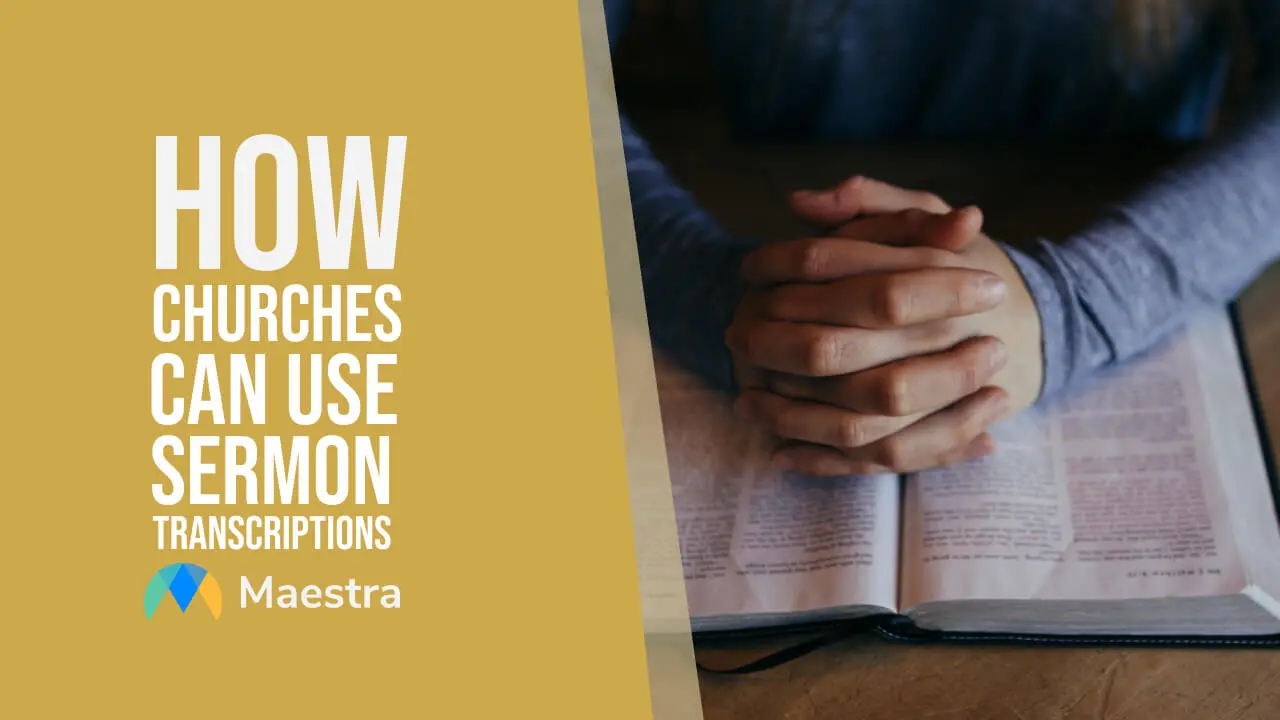How Churches Can Use Sermon Transcriptions

How Sermon Transcription Works
Sermon transcription involves converting an audio or video recording of a church sermon into a text-based document. The process can be done manually by members of the church staff. However, it often takes a lot of time, effort, and resources to accomplish, especially for churches with a large backlog of sermon recordings. Transcription services can speed up the process of transcription significantly through the use of dedicated teams and speech-to-text software.Uses for Sermon Transcripts
Let’s explore the numerous ways churches can use sermon transcripts to augment their services and support members of their staff and congregations.Increasing Accessibility
Over the past few years, more and more churches have begun offering streaming options and video recordings of services online. This is a major step in terms of increasing accessibility to church services for anyone who cannot attend in person. However, churches can continue to make themselves more accessible and strive to support all members of their congregations by providing online transcripts. Sermon transcripts are a necessary resource for those who have hearing disabilities, as well as those who have ADHD or APD.Transcribed Sermons as a Resource
For anyone studying the Bible, a sermon transcript can be a powerful resource to expand their knowledge. Seminary students and theology researchers may consult a church sermon to learn more about specific topics or passages. Having sermons in text format can also be helpful for volunteers leading bible studies. It may be easier to locate and reference the subjects of their research when they exist as a transcript instead of just an audio recording. New believers, youth groups, and children may also find transcripts useful as they begin to learn about the Bible. Sermon transcripts are valuable resources for creating study guides or explaining difficult passages through examples. For instance, a youth pastor may print out a transcript from a recent sermon and share it with the youth group for discussion. Students can highlight their favorite passages and ask questions as they prepare to move onto new stages of their faith. Transcripts can also help students catch up in a sermon series when they are unable to attend on Sunday morning. No matter how much a member of the congregation enjoyed a particular church sermon, they most likely will not be able to remember every detail. Uploading transcribed sermons online allows members of the congregation to relive the messages that inspired them. Using these files, they can also return to notable passages to broaden their understanding of the sermon.Connecting with Larger Audiences
Providing online access to sermon transcripts also opens the door to a much larger audience. Though local communities remain an integral part of most church operations, online transcripts allow churches to connect with people around the world. Search engines can locate any text posted to the church website. As a result, a dedicated archive of sermon transcripts can greatly increase SEO and bring more interested people into the community.Creating a Catalog of Work
Transcribing sermons helps pastors create a catalog of their own work. This catalog can be used as a reference point, a way to keep track of messages and topics previously discussed, and a portfolio that helps pastors showcase their abilities when moving to a new position. Not to mention, transcripts eliminate the hassle of digging through hundreds of old recordings to find the one sermon you need to reference. Simply search the archive using keywords, dates, or other descriptors to bring up relevant passages from past sermons. A sermon catalog may also be an excellent resource when training new pastors, deacons, youth leaders, counselors, and other church contributors. By reviewing the catalog, new members of the church staff can quickly become acquainted with the mission and message of the church.Contact Maestra for Sermon Transcription Services
Transform your church services into an everlasting resource and connect to a larger audience with Maestra’s unparalleled sermon transcription services. Maestra offers Automatic Audio-to-Text and Video-to-Text Converters that transcribe audio and video recordings to text in a matter of minutes. Our tools harness the power of AI technology to provide accurate transcriptions with a speedy turnaround time. You can rely on Maestra for:- Transcripts in more than 80 languages.
- Data security via encryption.
- An interactive and collaborative text editor.
- Automatic speaker detection.
- Accurate capitalization and punctuation.
- Support for all audio formats, such as MP3, AAC, FLAC, M4A, OPUS, WAV and WMA.
- Regular updates and improvements to our AI technology.
